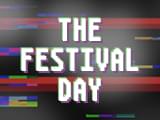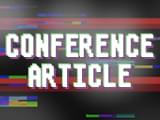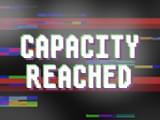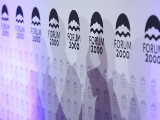17:15 - 18:15
|
|
Democracy Dialogues Václav Havel Library
Havel’s Legacy: A View from Afar
Event description:
Václav Havel was a thinker who believed in that truth, and moral conscience must prevail over lies and hatred. Havel's challenge was to become a canny politician while remaining a moral one, but he has always remained a figure of intellectual integrity with an acute sense of responsibility. He was a man of ideas; an accomplished playwright who was pushed into the political sphere by taking his own ideas seriously and attempting to live up to them. This is what Havel termed “living in truth”. Havel was convinced that maintaining moral integrity was not a choice but a necessity. What is the philosophical and political legacy of Václav Havel 30 years after 1989? What is his relevance in today's world?
|
19:00 - 21:00
|
|
Ceremony and Reception Prague Crossroads
Opening Ceremony
By special invitation only.
|
09:15 - 10:30
|
|
Opening Panel Žofín Palace, Forum Hall
Ambitions of 1989? Ambitions of Today?
Event description:
In 1989, people rallied against governments with dismal human rights records and a lack of respect for the rule of law. Protests in Beijing, Berlin, and Prague coincided with ongoing or looming democratic transitions in Chile, Nicaragua, South Africa and elsewhere. Citizens globally asked for more freedom and democracy and hoped for a just society. Since then, the spirit of liberty and civic responsibility in new democracies, as well as in the more established ones, have faced many difficult tests and today we are at perhaps one of liberal democracy's most challenging moments. Inability of political elites to face climate change, a growing gap between winners and losers of globalization, the impact of new technologies, and other major trends drive voters to elect untested or even populist leaders. Instead of following ambitious goals, we seem to struggle to at least keep the status quo. What are our ambitions today? What is our vision for the future of democracy? And what is our vision for the future of the world?
|
10:45 - 11:45
|
|
Anniversary Panel Žofín Palace, Forum Hall
30 Years of Czech Human Rights Policy Abroad: Achievements and New Challenges
In cooperation with the Ministry of Foreign Affairs.
Event description:
Since the 1989 Velvet Revolution, the foreign policy of Czechoslovakia, and later Czechia, has been largely guided by the values of freedom and human rights. For most of the three decades, the direction provided initially by Václav Havel and Jiří Dienstbier has offered support to people living under a dictatorship, to countries in transition, to civil society, independent media, and human rights defenders in Cuba, Ukraine, Belarus, Burma and elsewhere. What is the footprint left by the Czech human rights foreign policy? What should be its priorities in the future?
|
|
Panel Žofín Palace, Conference Hall
Can Democracy Deliver? How to Make Liberal Democracy Great Again
In cooperation with the Centre for Liberal Modernity and the IDC Herzlyia.
Event description:
While the crisis of liberal democracy is an international phenomenon, the debate over root causes and policy responses is still taking place mainly in national contexts. The more transnational discussion is needed, fostering the exchange on critical questions. What can be done to rebuild popular support for liberal democracy and to improve its abilities to act in a rapidly changing international, economic, and political environment? How can we reconcile liberal openness towards globalization, immigration, diversity and innovation with conservative demands for security, togetherness and stability – or at least avoid unchecked confrontation along with these conflicting values? To what extent are strong public institutions necessary to guarantee freedom and stability, and how they can do so without restricting the space for civil society and entrepreneurship?
|
|
Coffee Table Conversation Žofín Palace, River Hall
Virtual Insanity? How to guarantee transparency in digital political advertising
In cooperation with the European Partnership for Democracy.
Event description:
The phenomenon of digital political campaigning has caught global public attention with the twin shocks of Brexit and the 2016 US Presidential election (and the related Facebook-Cambridge Analytica scandal). Since then, the tension between the integrity of electoral systems and a vastly unregulated digital sphere have arguably become an inherent danger to democracies worldwide. Taking the European Parliament elections of May 2019 in the Czech Republic as a case study, what regulatory solutions exist for policy makers at national and at European Union level to guarantee the transparency of political advertising online?
|
|
Workshop Goethe-Institut, Conference Room
Shrinking space for independent journalists: How to survive and thrive
In cooperation with European Endowment for Democracy.
Event description:
The media landscape today is undergoing unprecedented change. In both authoritarian states and open societies, journalists are fighting to retain, and in extreme cases, forge a space for independent media to survive. Journalists from Syria and Moldova will share their experiences of working in politically charged environments and how they thrive in spite of the shrinking space for independent media. Should journalists assume a more ‘political’ or activist role? How can independent media thrive in environments where their freedom to report is consistently being challenged? What can governments and civil society do to help independent media and professional journalism survive in restrictive environments?
|
12:00 - 13:00
|
|
Panel Žofín Palace, Forum Hall
Democracy in Times of Zuckerberg and Xi
Information Centre for Democracy and Human Rights in China.
Event description:
Despite their many positive aspects, information technology and artificial intelligence have recently become widely used tools for distorting the truth, for political manipulation, and the restriction of personal freedoms. Recent events such as the Russian disinformation campaigns, the role of Cambridge Analytica in Brexit, or the creeping digital totalitarianism in China all show how technology can threaten freedom and undermine democratic principles. What are the main threats of current technologies to our freedoms and security? How can democratic societies prevent their misuse? What should be the absolute priority?
|
|
Panel Žofín Palace, Conference Hall
60 Years of Communism in Cuba
Democratic Solidarity.
Event description:
Along with China, Laos, North Korea, and Vietnam, Cuba is one of the five remaining modern-day communist countries in the world. Its communist regime, established in 1959, survived even the collapse of its one-time supporter, the Soviet Union. Despite the new constitution and the so-called 'transition of power' to the new President Miguel Díaz-Canel in 2018, Cuba remains a country ruled by a communist government. What lessons can Cuba learn from the countries that successfully overthrew their communist regimes in 1989? Is there a role for the international community and regional actors in supporting Cuba's eventual transition to democracy?
|
|
Coffee Table Conversation Žofín Palace, River Hall
Catalonia: What Lies Ahead?
Event description:
The status of Catalonia has been a dominant topic in Spanish politics in recent years. It also has a spillover effect in the European Union, posing important questions on how the EU should approach attempts to independence of parts of member statesˈ territories. Even though it has been overshadowed by Brexit, the Catalan question remains unresolved and will remain an important issue to deal with in the future. How has the situation developed since the so-called referendum in 2017? Should the EU change its stance and follow the right to self-determination? What are the wider, European and international, consequences of the Catalan discussion?
|
|
Youth Panel Goethe-Institut, Conference Room
Youth: "How Will We Form Europe in the Next 30 Years?"
In cooperation with the European Commission Representation.
Event description:
Václav Havel often spoke of the need for positive dreams and visions that provide the necessary energy for societal transformation. In many of his speeches and essays, he contemplated the principles governing united Europe, its ethical basis and institutional organization. The goal of this panel discussion is to offer the floor to representatives of the younger generation of Europeans and future leaders. They are invited to dream about the European future and reflect on key questions of the European project. How might Europe look like in the next 30 years? Which common themes should serve as the platform for further European integration? What should be the future role of Europe in the world?
|
13:00 - 13:15
|
|
Award Ceremony Žofín Palace, Conference Hall
Award for Committed Diplomacy in Cuba 2016-2018
Democratic Solidarity in cooperation with the Center for the Opening and Development of Latin America (CADAL).
Event description:
Since 2003, the Award for Committed Diplomacy in Cuba has been organized by the Center for the Opening and Development of Latin America (CADAL). It highlights the solidarity work of foreign diplomats who served on the island, providing recognition, support, and protection of those acting peacefully in defense of human rights and the promotion of political pluralism. In its sixth edition, the prize is awarded to Czech diplomat Filip Vurm, nominated by various groups of the Cuban civic movement in different parts of Cuba.
|
13:10 - 14:00
|
|
Book Signing Žofín Palace, Foyer
Gerd Leonhard "Technology vs. Humanity"
|
13:00 - 14:15
|
|
Networking Lunch Žofín Palace, Delegates' Lounge
Lunch BREAK
|
14:15 - 14:45
|
|
Žofín Conversation Žofín Palace, Forum Hall
Hong Kong and Its Future
Event description:
Since 1997, Hongkong has been a part of China, living under the promise of "one country, two systems.” However, the city's open and liberal mindset has been increasingly at odds with Beijing, which seems intent on gradually converting Hongkong to one system - a communist dictatorship. Hongkongers are, perhaps surprisingly to their Beijing rulers, strongly opposed to this.
|
14:45 - 15:45
|
|
Panel Žofín Palace, Forum Hall
Václav Havel: Responsibility As the Ultimate Measure of Human Action
In cooperation with Václav Havel Library.
Event description:
If the future of the world appears increasingly uncertain, it is also because so many people, including politicians, refuse to take the responsibility for their own words and actions, for the habitat in which we all live, and for the future consequences of today´s decisions. For Václav Havel, responsibility, rooted in the “memory of being” beyond the horizon of everyday life, was the ultimate measure of the meaning of our existence. The imperative of responsibility was his unfailing compass both in his writings and in his political life. What would it take for the politicians, business people, and opinion-makers of today to accept their intrinsic responsibility?
|
|
Panel Žofín Palace, Conference Hall
America First! But What About the Rest of Us?
Event description:
Putting one’s interest first is a natural choice but cannot be the end of the story. America has been a guarantor of global order for much of the 20th century and into the new millennium. This was due to its power, but also its role in the making and upholding of international institutions and agreements. Today, U.S. dominance seems diminished, and its interests appear to be turning inwards. How does current America see its role in the world? Does the Trump administration still believe in multilateralism? How much has the transactional approach penetrated the US foreign policymaking? Will coalitions of the willing eventually undermine long-standing alliances? Are we giving up on global standards and rules and heading towards a ‘new cold war’?
|
|
Coffee Table Conversation Žofín Palace, River Hall
Indignados, Yellow Vests, or Fridays for Future: Can Social Movements Re-invent Democracy?
Event description:
Social movements can press governments to reorganize their decision-making in ways that allow the direct and indirect participation of more voices in areas such as political development, education and the environment. They can move community institutions and civic associations to engage effectively in traditional political arenas but also to create and take part in a new, more encompassing democratic politics. However, this dynamism can also block, paralyze, and perhaps even threaten the everyday life of a democratic state and its institutions. Is the recent example of the "yellow jackets" in France a symptom of a profound crisis in democracy? Is the current Fridays for Future movement undermining the democratic process with its appeal to Science as an ultimate carrier of truth or is it just articulating a legitimate public interest? Can social movements pave the way for a new form of democratic politics?
|
|
Panel Goethe-Institut, Conference Room
How Media Can Help Restore Public Trust in Democracy
In cooperation with Project Syndicate.
Event description:
Around the world, open societies are being tested by a crisis of trust. And while a strong, independent media is the lifeblood of free societies, traditional outlets today are grappling not only with acute threats and intimidation, but, more broadly, with declining readership, influence, and revenue. At the same time, digital media have been ripe for anti-democratic forces’ exploitation of growing mistrust of established institutions. As a result, public trust in the media – and liberal democracy – is alarmingly low around the world. What has caused public trust in democratic institutions to deteriorate? How should media organizations – which are both the reporters and subjects of this story – respond?
|
15:15 - 16:00
|
|
Meeting Žofín Palace, Lord Mayor's Hall
Coffee with Friends of Forum 2000
By special invitation only.
|
16:00 - 17:00
|
|
Panel Žofín Palace, Forum Hall
Running a Country According to "Likes"
Event description:
What does society expect from its political leadership today? Are short-term politics, based on opinion polls and immediate online feedback, hurting the long-term perspectives of democratic countries? Can coherent strategies still be implemented? How does the political class deal with this challenge? Is there still a place for responsible leadership?
|
|
Panel Žofín Palace, Conference Hall
Central Europe: The Key to the EU's Future?
In cooperation with the Polish Institute Prague.
Event description:
Central Europe, in particular the Visegrad Group, has not received the most favorable publicity in recent years, with issues such as the V4 reaction to the immigration crisis or the accusations about the weakening of the rule of law being still hotly debated. On the other hand, the CE has experienced years of steady economic growth, its populations are strongly pro-European, with a vigorous civil society. So, what is the true state of Central Europe? Is there a chance for the region to become a major player in the debate over the future of the EU and its role in the world? Can the CE's shared experience with communism and democratic transition be a valuable asset, while the EU is facing troubled transatlantic relations, aggression from Russia, and the menacing rise of China?
|
|
Panel Žofín Palace, River Hall
Can business help reverse democratic decline?
In cooperation with the Center for International Private Enterprise.
Event description:
The present era of democratic decline is taking place during a global economic upturn, which offers both opportunities and challenges. The autocrats have preyed on the openness of democratic economies, presenting new challenges to the governance of the countries receiving their capital. This capital not only benefits few with little to no democratic oversight but also exacerbates existing threats from within. In fact, many of the world’s democracies have exhibited serious stresses, including backsliding on institutional reforms, highly partisan politics, and the resurgence of corruption. How can civil society and business work together to forge locally driven initiatives to address these challenges?
|
|
Panel Goethe-Institut, Conference Room
Challenges to Democracy in Latin America: Can the International Community Help?
Democratic Solidarity in cooperation with CASLA Institute.
Event description:
The success of the 1989 revolutions would not have been possible without the support of international actors and foreign powers. Such an enabling environment is one of the critical factors in the process of transition to democracy. Many Latin American countries are still experiencing a lack of international support and involvement in their democratization processes. What steps should the international community and regional actors take to support democracy in Latin America? What should be the approach of the international community towards the current situation in Venezuela? And what about Bolivia, Nicaragua, and Cuba?
|
17:05 - 17:35
|
|
Žofín Conversation Žofín Palace, Forum Hall
A Collapsing Global Order?
Event description:
Tectonic shifts are taking place in the international order; we see hesitant US, rising China, but also India, disruptive Russia, Iran, and others, as well as retrenchment from multilateralism and the rules based system that was shaped after the World War II and solidified in the early 1990s. On the other hand, the increased need for global cooperation caused by environmental challenges and the risks for the global economy is apparent. Is the current rules based international order over? What will replace it? What approaches should we expect from the main global players? What should we brace for?
|
17:45 - 18:00
|
|
Special Address Žofín Palace, Forum Hall
Special Address
|











